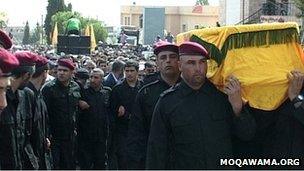Hezbollah military commander 'killed in Syria'
- Published

A senior military figure in the Lebanese Shia Islamist group Hezbollah is reported to have died in Syria.
Hezbollah said Ali Hussein Nassif was buried in the Bekaa valley on Monday and had been killed "performing his jihadist duty", but did not say where.
Rebels said Nassif and several of his men had been killed in an ambush by the Free Syrian Army. Other reports said they had died in clashes on the border.
There has been no confirmation that he was Hezbollah's commander in Syria.
The US has accused Hezbollah of "providing training, advice, and extensive logistical support" to the Syrian government, an allegation the group has denied.
Lebanese officials also believe members of Hezbollah's military wing, the Islamic Resistance, are fighting in the Syrian conflict, citing as evidence a number of quiet burials of "martyrs" in Hezbollah-dominated areas.
"Hezbollah has been active in supporting the Syrian regime with their own militia," one official allied to a political bloc opposed to Hezbollah told the Washington Post last week. "They've been quite involved in a combat role, quite involved in fighting."
Obituaries for Hezbollah fighters have begun to appear in Lebanese newspapers, without the circumstances of the deaths being explained.
However, after another senior Hezbollah military commander, Musa Ali Shahimi, was reportedly killed fighting in Syria in August, there was a public funeral attended by two Hezbollah MPs in the capital, Beirut.
As with Ali Nassif, the pro-Hezbollah news website, al-Intiqad, reported only that Shahimi had "died while performing his jihadist duty".
According to Syrian activists and the rebel Free Syrian Army, Nassif was travelling in a car near the Syrian border town of al-Qusair at the weekend when a roadside bomb was detonated nearby. It is not clear whether he was killed by the blast or in an ensuing gunfight.
However, sources in Baalbek - the main town in the Bekaa valley - told the Reuters news agency that Nassif and two other Hezbollah members were killed when a rocket hit a building in which they were staying.
A security official told the Associated Press that Nassif's body was returned to Lebanon through the Masnaa border crossing on Sunday.
Meanwhile, Hezbollah's al-Manar TV, and the pro-Syrian regime Lebanese newspaper al-Diyar, have both reported that Syrian President Bashar al-Assad has ordered thousands more troops sent to the northern city of Aleppo to finish the battle against rebels there.
Al-Diyar said Mr Assad was flown to Aleppo by helicopter and was personally directing the campaign, thought that has not been confirmed.
Border tensions
In a separate development, the UN's refugee agency said the number of Syrian refugees in neighbouring countries had reached 311,500.
"Many refugees and the communities hosting them are already running out of resources," UNHCR spokesman Adrian Edwards told reporters.
Last week, the UN and other humanitarian agencies launched an appeal for $487m (£301m) to help up to 710,000 Syrians who they estimate will have fled to Turkey, Jordan, Lebanon and Iraq by the end of the year.
Meanwhile, the US has played down the significance of video footage that emerged on Monday purporting to show the missing US freelance journalist Austin Tice being held by a group of masked men.
State department spokeswoman Victoria Nuland said the video might have been staged and officials believed Mr Tice was being held by the Syrian government. Mr Tice disappeared near Damascus in mid-August.
Russia has urged Nato and regional powers not to seek any pretexts for military intervention in Syria.
Deputy Foreign Minister Gennady Gatilov said Moscow opposed the creation of humanitarian corridors or buffer zones to protect civilians. He also called for calm along the border between Turkey and Syria.
On Tuesday, Turkish troops fired across the border into the north-eastern Syrian province of Hasaka, killing a Kurdish militiaman and wounding two others, the UK-based Syrian Observatory for Human Rights said.
The activist group said the Kurds were members of the Popular Protection Units (YPG), a militia close to the Kurdish Democratic Union Party (PYD), which the Turkish government has accused of being a front for the banned Kurdistan Workers' Party (PKK).


